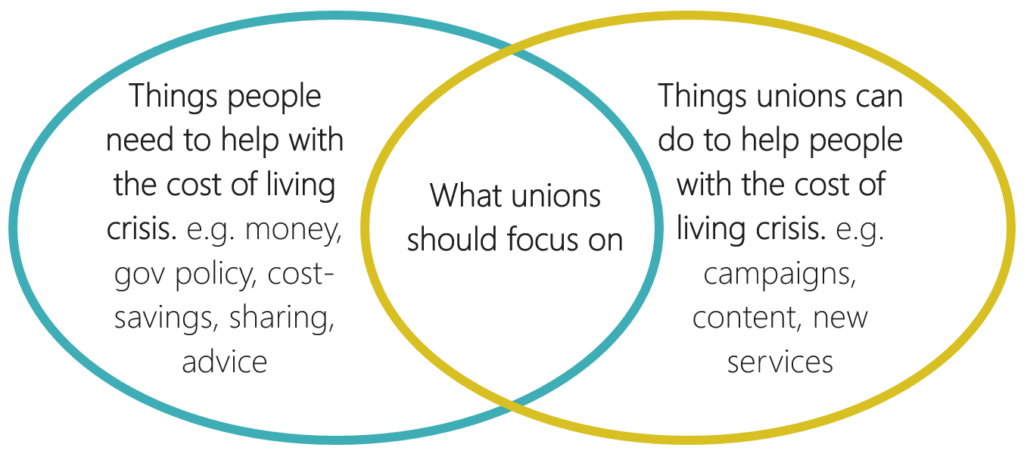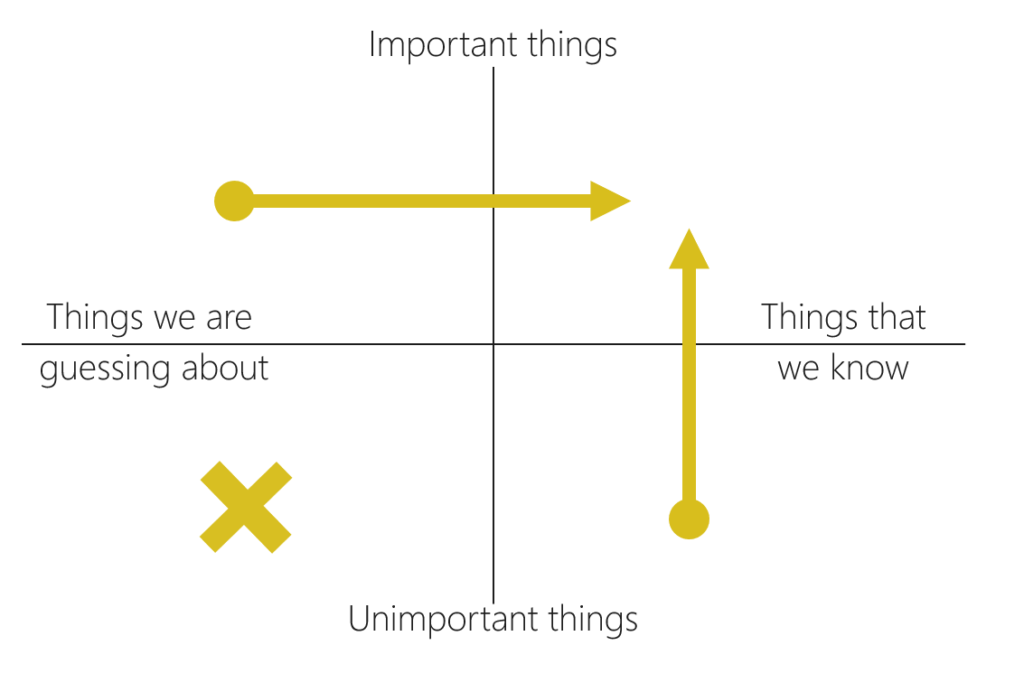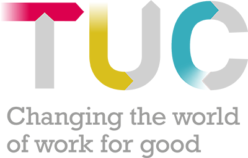Last week’s TUC Digital Lab workshop brought together colleagues from different unions to discuss unions’ digital responses to the cost of living crisis.
In short – what can we all do to help people when: Inflation is running at 9-11%; energy bills are soaring; the government response is weak; and their default position is to be anti-worker?
At the same time as inflation is rising, there is a potential moment for trade unions to make change – the “Mick Lynch effect” is driving interest in unions, more strike ballots are on the way, a recession is looming, a new Prime Minister will appear at some point and there could even be a General Election within the next year.
As you can see, there was a lot on our collective plate! The session was therefore an effort to kick off some new thinking and ideas about the topic and discuss what we might like to research and learn together in the coming months.
Understanding the “problem space”
As always, the key isn’t knowing what you could do, it’s knowing what you should do.
For unions, there’s quite a lot of overlap between “things people need to help with inflation” and “things unions can do to help”. For members and non-members alike, unions can run campaigns, create new content, gather and use stories as part of data supporting policy changes, develop new services and more.

To know what to do, as we should with all digital projects, products and services, we need to start with research that increases our degree of certainty that we are doing things to solve important problems.
What’s in that overlap between the blue and yellow bubbles?
What do we need to learn more about? What’s important and will really help people?
We can use a simple two-axis model to think about this:

As we think about where our knowledge and ideas sit on these axes, we can work out where to put effort into research:
- If we think it’s unimportant, we don’t need to learn much more about it.
- If we think it’s important, but we don’t know much, we can do research to help us move it into the top right quadrant.
- If we know a lot and we know it’s important, we can start working on ideas and testing them to increase our certainty of their effectiveness.
User research methods
In the workshop, we discussed this framework and started to generate the questions and hypotheses that could underpin future research. First, by developing scripts for user research conversations, and second by listing out things we thought might be “pain points” for people.
By understanding these well, we can make things people want, rather than try to make people want things. Solving a need that a user currently perceives, from a position that they understand, is much easier than convincing them that a new solution you have designed actually fits a need that you believe they should be concerned about.
For the user research conversations, we offered some general tips (If you’re interested, there’s a helpful video guide to user research from one of our earlier workshops here):
- Get some general background information as warm up. This also helps you set any comments in context and maybe understand what is leading people to say certain things.
- Focus on how people solve the problem (of things costing too much and/or having too little money). Asking about real behaviours rather than users’ opinions wherever possible will give more useful insights. Otherwise you risk users telling you what they think you want to hear.
- Ask lots of “why” questions (“why did you do it this way?”). Yes or no questions are less useful unless they lead onto deeper understanding. The insight you are looking for may be one or two layers back from an initial answer.
- Avoid incorporating your opinions. Stay neutral, rather than letting on what might be the “right answer” to a question.
Workshop participants proposed sample interview questions that they could use to stimulate discussion:
- Have you had to think about your journey to work?
- Have you changed anything about your living situation?
- Have you cut back on spending? On what?
- How/why did you choose?
- How do you relax? Has that changed?
- Are there any bills that you’re concerned about?
- Do you find yourself talking about money more?
- Have you called in debts from others?
- Do you find yourself helping other people?
- Do you find yourself more stressed?
- Are you thinking about changing job to try and get more money?
In the workshop we obviously weren’t able to conduct any interviews to verify this, so we worked on some sample assumptions for responses that we could generate from our own experience with members so far.
We also looked at potential pain points that members might be feeling. These could be areas where the union could offer direct help, or just context the union should be aware of. Again, the list was long, and here are a few:
- How do I pay my bills?
- What happens if I get into debt?
- What support is there for me?
- Can I afford to retire?
- Can I afford my union dues?
- What happens if I need to support someone else?
- How do I negotiate alone?
- How can we take action to win a better pay deal together?
- How do I find out what my union is doing?
- Christmas/birthdays/other celebrations are coming. Can I afford them?
- Will I have to leave this job I like for another?
- Am I eligible for a cost of living payment?
- Will I be forced to take on more hours (and unsocial ones at that)?
More research: from understanding to exploring
The point of this type of research is that it’s “generative”. It helps us understand a problem better, in order to find appropriate solutions.
As we move on to exploring those solutions, through sketching ideas, pitching them to each other, getting feedback, then moving on to prototypes of gradually higher and higher fidelity, we are starting to perform “evaluative” research (in other words, we are researching how well our ideas solve the original problem).
The next part of our discussion moved into this “mixed” phase – where we were obviously still unsure that our knowledge was firm enough to move forward, but where exploring some ideas might help us put a little concrete under our feet.
To move forward, we worked in pairs, thinking about:
- Which problems do we want to work on? (i.e. those that are important and can have a significant positive impact)
- What types of idea might be most helpful?
- Creating new or repurposed content or information
- Developing campaigns
- Building the evidence base for change
- Inventing entirely new services
We followed a quick three-stage idea generation process:
- Developing a long list of ideas
- Picking your the most interesting/promising
- Turning it into a one-page pitch to get feedback on
This method is a very accelerated process compared to any normal research and design work, but the essence is the same – getting as quickly as possible to understanding the minimum you need to find out whether an idea has promise.
We structured our one-page pitches to include:
- What’s the idea called?
- Who’s it for?
- How does it work?
- How will it help?
- How will people find out about it?
- What do you need to make it happen?
- What do you still need to learn?
Ideas to try
Here’s some of what we came up with as potential pilot projects:
- A “cost of living hub”, where the union draws together all its resources that can help people save money, along with information about help, as well as what the union is working on to increase wages.
- An energy partnership, where union members make commitments to switch supplier, and the union uses that scale to bargain for the best possible energy prices for the whole group.
- Campaign & organising toolkits for unions in dispute over pay.
- A union ride-sharing scheme, helping people reduce the cost of their commute. Particularly focused on contract workers in the entertainment industry, where a large group will take a temporary contract in the same location.
- A campaign to encourage companies to lay on minibuses to work, to help employees save money.
- Improving the resources and process for accessing union benevolent funds. These can be hard to understand and slow to apply to.
- Launching a “Christmas Fund”, to help stretched parents save (or simply afford) to get their kids presents.
- A “code sharer” group, where members can share shop discount codes and offers.
- A tool to help branches organise “the Costco run”, helping members get cheaper stuff through bulk buying.
- Developing a negotiation toolkit, to help people who negotiate alone (such as freelancers, or people in non-recognised workplaces) get better pay.
- Developing resources and guidance to help people manage financial stress.
The list could have gone on and on…
Most of these ideas could be quickly tested, drawn together using services that others have already built. They could be piloted in a small number of workplaces to find out what impact they have, before being scaled up if they work.
Next steps
We are currently looking into the potential to run a real-world member research programme around the cost of living, developing our understanding on these themes and kicking off work towards building common assets for unions to use in materials for their own websites’ cost of living advice hubs.
This programme would act as a project-based training course for union staffers who wish to develop user research skills. Participants would need to commit around 6 hours to it, including training sessions and using those skills in conducting interviews and drawing out insights, as well as helping to find members to interview. The TUC would cover the programme’s costs and share the practical results for unions in developing their own content.
If you’re interested in participating, or suggesting to someone you work with, please get in touch.
Sam Jeffers (of The Shop) is a consultant to the TUC Digital Lab, and facilitator for the workshop series.

